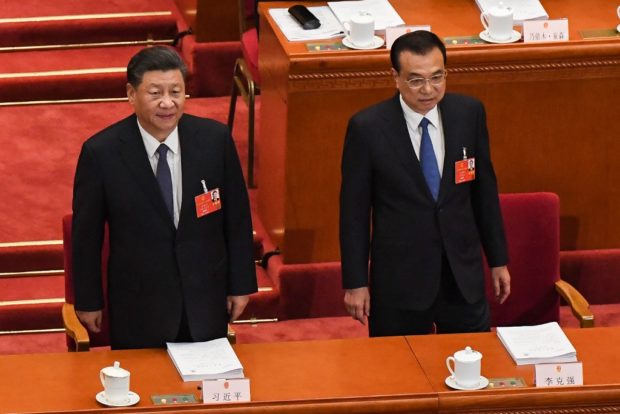
Chinese President Xi Jinping and Premier Li Keqiang arrive for the opening session of the National People’s Congress at the Great Hall of the People in Beijing on May 22, 2020. Photo by Leo RAMIREZ / AFP
BEIJING, China — China faces “immense” economic challenges as it emerges from the coronavirus pandemic, Premier Li Keqiang warned Friday as he opened his nation’s annual legislative session that will seek to tighten Beijing’s control over Hong Kong.
Li’s opening speech to the 3,000-member National People’s Congress (NPC) is China’s version of the US president’s “state of the union” address, and he went straight into the threat of the pandemic that emerged on Chinese soil.
“We have made major strategic achievements in our response to COVID-19,” Li told mask-wearing delegates in Beijing’s cavernous Great Hall of the People.
“At present, the epidemic has not yet come to an end, while the tasks we face in promoting development are immense,” he continued, adding that China’s government must “redouble our efforts to minimize the losses resulting from the virus.”
Citing the “great uncertainty” ahead, Li took the rare move of refraining from announcing a 2020 growth target for China’s coronavirus-battered economy.
Li said only that Beijing will “give priority to stabilizing employment and ensuring living standards”.
China is still recovering from the COVID-19 outbreak that first appeared in the central Chinese city of Wuhan late last year and spread globally — sparking accusations that Beijing had mishandled its initial response, leading to nearly 330,000 deaths and economic carnage worldwide.
The pandemic has sent US-China tensions spiralling to new heights, with US President Donald Trump this week saying Beijing was responsible for “mass worldwide killing.”
China’s official COVID-19 case numbers have dwindled in recent weeks even as millions were sickened abroad, which Beijing says proves the superiority of its authoritarian system.
Li’s annual address is closely watched for clues on the ruling Communist Party’s political, economic, and social priorities, including towards semi-autonomous Hong Kong.
Hong Kong under siege
Parliament spokesman Zhang Yesui late on Thursday said the chamber would consider a proposal for security legislation in Hong Kong, which was immediately denounced by the United States and pro-democracy figures in the financial hub who called it a death sentence for the territory’s unique freedoms.
Details were not given but China has made clear it wants legislation passed after Hong Kong was rocked by seven months of massive and sometimes violent pro-democracy protests last year.
In the speech, Li said the government would “establish and improve the legal systems and mechanisms to safeguard national security” in Hong Kong.
A bid to enact such legislation in 2003 was shelved after half a million people took to the streets in protest.
But the controversial initiative has been put back on the table in recent years as the pro-democracy movement has gained pace, and the proposal is expected to stoke similar anger.
“This is the end of Hong Kong, this is the end of ‘One Country, Two Systems,’ make no mistake about it,” Civic Party lawmaker Dennis Kwok told reporters, referring to China’s description of the territory’s status.
“One Country, Two Systems” gives Beijing ultimate political sway over Hong Kong but allows the former British colony to retain liberties unseen elsewhere in China.
US State Department spokeswoman Morgan Ortagus said imposing such a law would be “highly destabilizing” and meet US and global condemnation.
President Donald Trump promised to respond “very strongly” once details emerge, and US senators introduced legislation to impose sanctions on any entity involved in curbing Hong Kong’s autonomy.
Targets could include police who crack down on demonstrators, Chinese officials involving in Hong Kong policy, and banks that conduct transactions with anyone who infringes on its freedoms.
Economic uncertainty
China’s economic growth shrank 6.8 percent in the first quarter due to the virus, its first contraction in decades.
Li had originally been expected to announce a 2020 growth target of around six percent, but the pandemic has scrambled expectations, leaving millions of Chinese jobless and imperilling countless businesses.
In a statement published after the speech finished, the government announced it would increase its military budget by 6.6 percent in the year.
The budget will be set at 1,268 billion yuan ($178 billion) for the year — the second biggest in the world after the US — continuing a downward trend in military spending and lower than last year’s increase of 7.5 percent.
China’s rapidly growing armed forces are a source of keen interest in the United States and neighbouring Asian countries nervous about Beijing’s rise.
The NPC’s highly choreographed annual meetings are conducted amid great pomp aimed at underlining Communist Party control.
But the session was delayed more than two months as China struggled with the coronavirus outbreak, the first postponement since the 1966-76 Cultural Revolution, and cut in half from the usual two weeks.
Virus fears linger, with most delegates masked and subject to unprecedented safety measures.
Top national leaders like Li and Xi went bare-faced, however.
The session began with a minute’s silence for the country’s coronavirus victims.